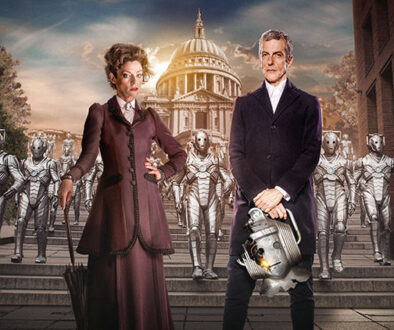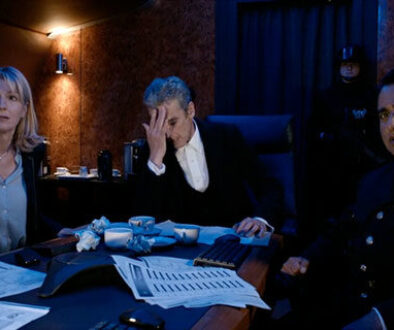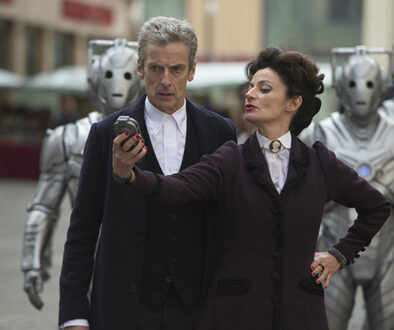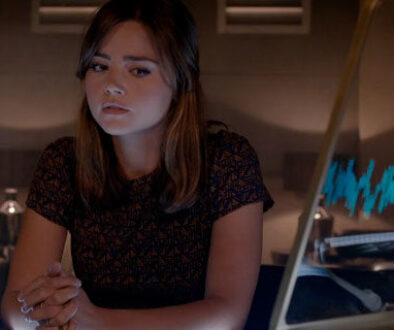Dark Water Review
Clint Hassell gives his verdict on the eleventh episode of Series 8.

Writing a review of the opening episode of a two-part finale is a bit like trying to discuss the first half of a mystery novel. While it’s possible to examine the set up, it’s difficult to provide any meaningful analysis. Luckily, Series 8 has been so tightly written, with each episode strategically placed to further common themes and narrative threads, that “Dark Water” feels less like “part one,” and more like “part eleven.” Though much of the episode is a prolonged set-up for next week’s “Death in Heaven,” “Dark Water” stands out because of two pinnacle scenes.
 In the pre-credits teaser, Clara has finally decided to be completely honest with Danny. Post-It notes hanging around her desk outline a planned speech detailing everything from Clara meeting “Rupert Pink” and inadvertently inspiring “Dan the Soldier Man” to the foreknowledge that “Courtney becomes the President.” Most importantly, Clara plans to “Just say it,” and finally declare her love for Danny in a more meaningful way than the irresolute “I love him,” stated in “The Caretaker.” Amy Pond similarly realized the depth of her love for Rory Williams, in “Amy’s Choice,” having faced the possibility of living in a world where he had died. Conversely, Clara’s proclamation comes just before Danny is hit by a car. While Doctor Who has previously made some incredibly bold statements of love – Rose tears a hole between universes to reunite with the Doctor, Amy and Rory repeated give up their lives to remain together, River risks all of reality collapsing in order to not hurt the Doctor – what makes Clara’s so affecting is that it is not said amidst peril, or with cosmic repercussions, but with relatable sincerity. “Not like it’s automatic, not like it’s how you end a phone call,” she says, “Danny, I’ll never say those words again, not to anyone else. Those words, from me, are yours now.” While Clara’s admission is narratively gratifying – her Series 8 story arc has been building towards this moment – it is also presaged as the cost for her repeated lies to him.
In the pre-credits teaser, Clara has finally decided to be completely honest with Danny. Post-It notes hanging around her desk outline a planned speech detailing everything from Clara meeting “Rupert Pink” and inadvertently inspiring “Dan the Soldier Man” to the foreknowledge that “Courtney becomes the President.” Most importantly, Clara plans to “Just say it,” and finally declare her love for Danny in a more meaningful way than the irresolute “I love him,” stated in “The Caretaker.” Amy Pond similarly realized the depth of her love for Rory Williams, in “Amy’s Choice,” having faced the possibility of living in a world where he had died. Conversely, Clara’s proclamation comes just before Danny is hit by a car. While Doctor Who has previously made some incredibly bold statements of love – Rose tears a hole between universes to reunite with the Doctor, Amy and Rory repeated give up their lives to remain together, River risks all of reality collapsing in order to not hurt the Doctor – what makes Clara’s so affecting is that it is not said amidst peril, or with cosmic repercussions, but with relatable sincerity. “Not like it’s automatic, not like it’s how you end a phone call,” she says, “Danny, I’ll never say those words again, not to anyone else. Those words, from me, are yours now.” While Clara’s admission is narratively gratifying – her Series 8 story arc has been building towards this moment – it is also presaged as the cost for her repeated lies to him.
For the audience to realize what has happened, just ahead of Clara, and then be forced to watch her slowly grasp the truth, is incredibly painful and showrunner Steven Moffat is brave to risk taking the show to that place. Even more heartbreaking is the realization that, due to the timing of Danny’s last words, Clara cannot know for certain if Danny even heard her big revelation.
 In the crux of the scene, the shot match cuts from Clara running to the sight of the accident to her standing, days later, in the middle of the road, as if hoping to be similarly hit by a car. Unwilling to accept that such a trivial act has killed her boyfriend, Clara risks the odds, trying to prove that what happened to Danny wasn’t, as she tells her grandmother, “boring . . . ordinary.” Stunned and unable to feel or cry, she is preoccupied with the inherent unfairness of the situation. Anyone who has ever experienced a sudden, tragic loss of a loved one can attest that “Dark Water” realistically portrays the despair, numbness, and anger that follow in successive days.
In the crux of the scene, the shot match cuts from Clara running to the sight of the accident to her standing, days later, in the middle of the road, as if hoping to be similarly hit by a car. Unwilling to accept that such a trivial act has killed her boyfriend, Clara risks the odds, trying to prove that what happened to Danny wasn’t, as she tells her grandmother, “boring . . . ordinary.” Stunned and unable to feel or cry, she is preoccupied with the inherent unfairness of the situation. Anyone who has ever experienced a sudden, tragic loss of a loved one can attest that “Dark Water” realistically portrays the despair, numbness, and anger that follow in successive days.
The episode’s second pinnacle moment directly follows the opening credits, and demonstrates the depths Clara is willing to plumb to fix her problem. She asks the Doctor to take her to see an active volcano, the one place a TARDIS key can be destroyed. As she slips around the control room collecting the Doctor’s seven spare keys, it is obvious that Clara has specifically planned the exact moves necessary to quickly accomplish her task. The Doctor seems to know what is going on. “It’s rubbish,” he mutters to himself, seemingly about the volcano itself, but maybe about Clara’s reason for wanting to see it.
 The importance of the keys is certainly debatable, especially considering that both the Doctor and Clara have demonstrated the ability to open the TARDIS doors by snapping their fingers. The keys are symbolic for the seven keys carried by the previous eight full-time companions to have traveled with the Doctor, in the modern era.* As Clara throws each successive key into the lava, she is figuratively casting away all of the times in the Doctor’s past – including Rose with her father, and Amy and Rory – where the Doctor refused to break the rules of time travel to prevent a tragic death. “Time can be rewritten,” she quotes. The Doctor mentions paradox loops and that he knows when he can and cannot alter the course of history; however, much like in “Kill the Moon,” these arcane rules seem known only to the Doctor, further frustrating Clara. He tells her to throw away another key, and she scolds him for trying to usurp control of the situation – a tactic with which she is all too familiar after her time as “the Doctor” in “Flatline.” Mirroring Clara’s speech from “Deep Breath,” the Doctor demands that Clara either follow through with her threat, or back down. In her despair, Clara feels she has nothing to lose. “You know what, Doctor? When it comes to taking control, you really are out of your depth,” she counters, tossing four more keys into the lava. “I don’t care about the rules. I don’t give a damn about paradoxes. Save Danny. Bring him back, or, I swear, you will never set foot inside your TARDIS again.”
The importance of the keys is certainly debatable, especially considering that both the Doctor and Clara have demonstrated the ability to open the TARDIS doors by snapping their fingers. The keys are symbolic for the seven keys carried by the previous eight full-time companions to have traveled with the Doctor, in the modern era.* As Clara throws each successive key into the lava, she is figuratively casting away all of the times in the Doctor’s past – including Rose with her father, and Amy and Rory – where the Doctor refused to break the rules of time travel to prevent a tragic death. “Time can be rewritten,” she quotes. The Doctor mentions paradox loops and that he knows when he can and cannot alter the course of history; however, much like in “Kill the Moon,” these arcane rules seem known only to the Doctor, further frustrating Clara. He tells her to throw away another key, and she scolds him for trying to usurp control of the situation – a tactic with which she is all too familiar after her time as “the Doctor” in “Flatline.” Mirroring Clara’s speech from “Deep Breath,” the Doctor demands that Clara either follow through with her threat, or back down. In her despair, Clara feels she has nothing to lose. “You know what, Doctor? When it comes to taking control, you really are out of your depth,” she counters, tossing four more keys into the lava. “I don’t care about the rules. I don’t give a damn about paradoxes. Save Danny. Bring him back, or, I swear, you will never set foot inside your TARDIS again.”
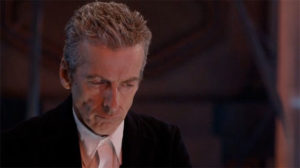 The scene is incredibly tense – providing the show’s best inescapable scenario since the cliffhanger ending of “Utopia” – and is marred only by its deus ex machina ending. Surpassing the fury seen in “Kill the Moon,” Clara demonstrates the extent to which she is willing to go, and that she ultimately chooses Danny over the Doctor. Amy makes a similar choice, too, in “The Angels Take Manhattan,” but by the time she does, it is too late for the Doctor to help her. Here, the Doctor can, and he does, though not before uttering a sly, deserved “Go to hell.” Regardless of his cold, callous, dark demeanor, the Doctor is still Clara’s friend, and his inquiry, “Do you think I care for you so little that betraying me would make a difference?” is a defining moment, not just for Twelve, but for the Doctor, in general. It makes sense that, having lived for 2,000 years, the Doctor is exceedingly good at a lot of things, including forgiveness. Who could live with a burning hatred and unresolved tension for thousands of years?
The scene is incredibly tense – providing the show’s best inescapable scenario since the cliffhanger ending of “Utopia” – and is marred only by its deus ex machina ending. Surpassing the fury seen in “Kill the Moon,” Clara demonstrates the extent to which she is willing to go, and that she ultimately chooses Danny over the Doctor. Amy makes a similar choice, too, in “The Angels Take Manhattan,” but by the time she does, it is too late for the Doctor to help her. Here, the Doctor can, and he does, though not before uttering a sly, deserved “Go to hell.” Regardless of his cold, callous, dark demeanor, the Doctor is still Clara’s friend, and his inquiry, “Do you think I care for you so little that betraying me would make a difference?” is a defining moment, not just for Twelve, but for the Doctor, in general. It makes sense that, having lived for 2,000 years, the Doctor is exceedingly good at a lot of things, including forgiveness. Who could live with a burning hatred and unresolved tension for thousands of years?
 The remainder of the episode is good, unspooling a series of reveals that further the plot in preparation for next week’s finale. While the reveal of Missy as the Master is meaningless without the context that “Death in Heaven” will provide, Seb is hilariously detached, exasperatedly polite, and lubric, all at the same time. It’s difficult to decipher whether his behavior is a defense mechanism necessary to perform his morbid job duties, or if he’s kinda evil, making Chris Addison a terrific choice for the roll.
The remainder of the episode is good, unspooling a series of reveals that further the plot in preparation for next week’s finale. While the reveal of Missy as the Master is meaningless without the context that “Death in Heaven” will provide, Seb is hilariously detached, exasperatedly polite, and lubric, all at the same time. It’s difficult to decipher whether his behavior is a defense mechanism necessary to perform his morbid job duties, or if he’s kinda evil, making Chris Addison a terrific choice for the roll.
 3W’s “fishtank” displays are immediately reminiscent of The Tomb of the Cybermen, and anyone familiar with the classic serial could guess the monster that Dr. Chang’s demonstration of the properties of “deep water” foreshadows. This being said, the best reveal of the episode occurs just as the Doctor mutters to himself, “I feel like I’m missing something . . . obvious.” The doors to Dr. Chang’s office slide shut, revealing that mirroring the 3W logo alongside itself creates the iconic visage of a Cyberman’s face mask.
3W’s “fishtank” displays are immediately reminiscent of The Tomb of the Cybermen, and anyone familiar with the classic serial could guess the monster that Dr. Chang’s demonstration of the properties of “deep water” foreshadows. This being said, the best reveal of the episode occurs just as the Doctor mutters to himself, “I feel like I’m missing something . . . obvious.” The doors to Dr. Chang’s office slide shut, revealing that mirroring the 3W logo alongside itself creates the iconic visage of a Cyberman’s face mask.
The narrative finally exposes the tragedy surrounding Danny’s career as a soldier. He killed an innocent civilian boy, which explains why he now teaches math to children; he’s trying to make amends for what he did to one child, by enriching many others.
Moffat again returns to his signature trick of adding a sinister twist to everyday events, this time revealing that white noise on the television is actually voices from the afterlife begging loved ones, “Don’t cremate me.” As cremation is not the standard in the U.S., this portent carries a bit less horror than expected.
 In fact, the three words that carry the most weight aren’t “Don’t cremate me,” but “I love you.” Ironically, rather than utter the phrase with true, heartfelt emotion, Danny willingly taunts Clara with the phrase in order to convince her to not follow him into the Nethersphere. It is unfortunate that Danny’s conversations with Clara in “The Caretaker,” “Flatline,” and “In the Forest of the Night,” make the two seem ill-suited for each other. Despite Jenna Coleman’s exceptional performance in the opening scenes of “Dark Water,” it is difficult to be more than partially invested in seeing the two as couple. However, if Danny “deletes” his emotions, he’ll ostensibly be upgraded into a Cyberman. Could Dan, Dan the Cyberman and Clara the ex-Dalek be a match that’s made in “Heaven”?
In fact, the three words that carry the most weight aren’t “Don’t cremate me,” but “I love you.” Ironically, rather than utter the phrase with true, heartfelt emotion, Danny willingly taunts Clara with the phrase in order to convince her to not follow him into the Nethersphere. It is unfortunate that Danny’s conversations with Clara in “The Caretaker,” “Flatline,” and “In the Forest of the Night,” make the two seem ill-suited for each other. Despite Jenna Coleman’s exceptional performance in the opening scenes of “Dark Water,” it is difficult to be more than partially invested in seeing the two as couple. However, if Danny “deletes” his emotions, he’ll ostensibly be upgraded into a Cyberman. Could Dan, Dan the Cyberman and Clara the ex-Dalek be a match that’s made in “Heaven”?
*Adam and Rose share a key, in “The Long Game.”




